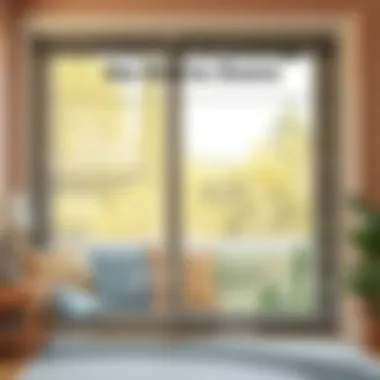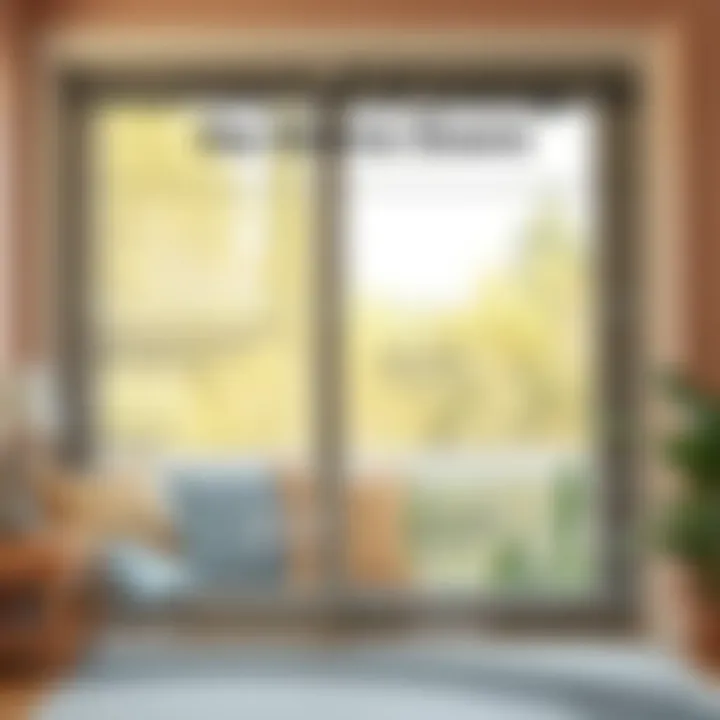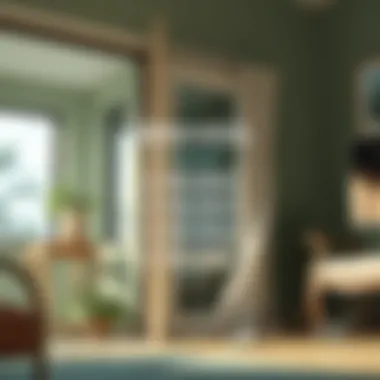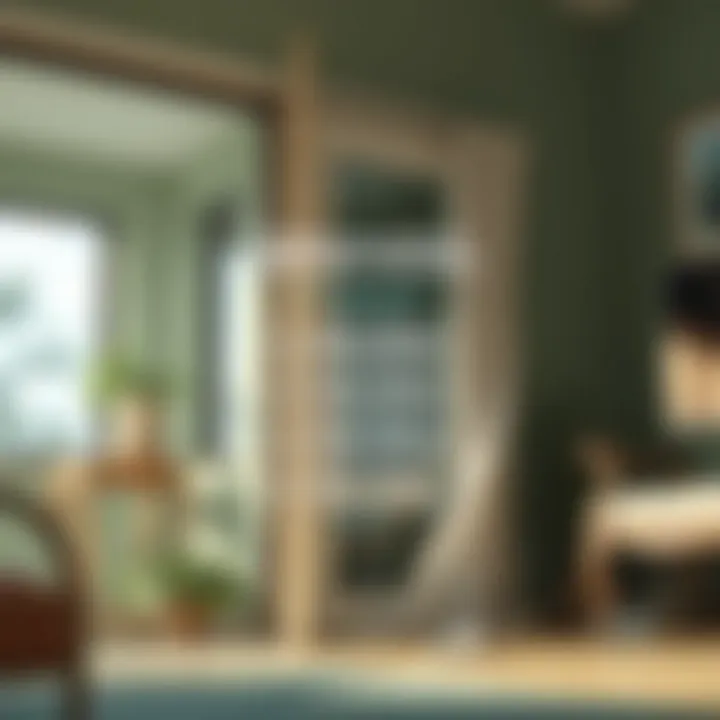Understanding Homeowners Insurance for Sliding Glass Doors


Intro
Homeowners insurance can often feel like a puzzle, especially when dealing with specific incidents like broken sliding glass doors. For many, these types of doors are a common feature in homes, especially in warmer climates where indoor and outdoor living often blend seamlessly. However, when disaster strikes—say, a storm or accidental damage—questions about coverage can quickly arise.
This article aims to clear the muddy waters, breaking down the various facets of homeowners insurance as it pertains specifically to broken sliding glass doors. From standard policy inclusions to less obvious exclusions, we’ll navigate through what you really need to know about your coverage. With a comprehensive understanding at hand, homeowners will be better prepared to tackle those unexpected mishaps and ensure that their insurance serves its intended purpose.
Let’s kick things off by unpacking some investment terms you might stumble upon along the way and how they relate to your homeowners coverage.
Prelude to Homeowners Insurance
Homeowners insurance is a crucial component for anyone who owns a property. It serves as a safety net, providing financial protection against various risks that can wreak havoc on your home, including accidental damages and natural disasters. Specifically, when focusing on aspects like broken sliding glass doors, it's essential to grasp the nuances of what homeowners insurance offers and covers.
Understanding homeowners insurance is vital for a couple of reasons. First, it helps homeowners gauge the security their investment has against unexpected incidents. A sliding glass door, for instance, could easily break due to a variety of causes—whether it be from a storm, a stray ball, or even regular wear and tear. Having insurance that covers such instances isn't just a box to check; it’s about safeguarding your sense of security.
Moreover, being informed allows homeowners to make educated choices about policy options. A well-rounded understanding will enable them to sift through the fine print and discover potential loopholes or exclusions. As sliding glass doors are increasingly becoming common architectural features in homes, knowing how they fit within insurance policies is increasingly important.
In summary, recognizing the importance of homeowners insurance isn’t just about complying with requirements; it’s about ensuring peace of mind for homeowners. When your home sustains unexpected damage, understanding your coverage can save you from financial strain, making it a cornerstone topic when navigating the ins and outs of home ownership.
Understanding Coverage Types
When it comes to homeowners insurance, grasping the various coverage types is essential. Each type serves a specific purpose and can have a substantial impact on how effectively you are protected against incidents like broken sliding glass doors. Understanding these different types ensures that you know what you're paying for and what your policy truly covers. Knowledge here can save you headaches later, particularly when it comes to filing claims or assessing your financial responsibilities in the event of damage.
Dwelling Coverage Explained
Dwelling coverage is a critical element of homeowners insurance that pertains specifically to the structure of your home. This coverage is designed to protect the dwelling itself, which includes the roof, walls, and floors—basically everything that makes your house a home. If a storm throws a branch through your sliding glass door, for instance, dwelling coverage would help cover the repair costs.
It’s vital to note that this coverage typically does not extend to external structures, such as a gazebo or shed. Those are usually covered under a separate section of the policy. When purchasing dwelling coverage, pay attention to the specific limits set by your insurance provider. You need to ensure that these limits adequately reflect the current value and potential rebuild costs of your home.
Personal Property Coverage
Personal property coverage looks after your belongings within the home, ranging from your furniture to electronics to decorative items. If someone were to break a sliding glass door, and in the process, some belongings were damaged from shattered glass or weather exposure, personal property coverage would come into play. It is crucial to meticulously list your personal items and understand the coverage limits and conditions.
There are two main sub-types to consider: actual cash value (ACV) and replacement cost. ACV takes depreciation into account, meaning if your ten-year-old TV was stolen, you'd only get a fraction of what you paid originally. On the other hand, replacement cost coverage allows you to replace lost items without factoring in their decreased value. Consider which option aligns better with your needs, as it significantly affects how much you might receive in a claim.
Liability Coverage Overview
Liability coverage is another essential component that safeguards you against legal responsibilities if someone gets injured on your property. For example, if a guest were to slip and fall through that broken sliding glass door and suffer an injury, liability coverage can help cover legal fees and medical expenses. The importance of this coverage cannot be overstated, as lawsuits can accumulate quickly, and liability protections act as a financial safety net for homeowners.
In most policies, this coverage also includes legal defense costs—should someone decide to take you to court over an injury or damage claim. It’s wise to carefully assess your liability limits and ensure they are in line with your risk exposure. Depending on your lifestyle, additional coverage may be warranted.
Understanding these coverage types prepares you better for navigating your homeowners insurance policy. Each offers unique safeguards against a variety of situations, elucidating just how imperative it is to know your coverage inside and out.
Types of Damage Covered
Understanding the types of damage covered under homeowners insurance is especially crucial for those who have sliding glass doors. These doors, while elegant, have their own specific vulnerabilities and, consequently, different aspects to consider when it comes to insurance coverage. Knowing what is or isn’t covered can save homeowners from unexpected financial burdens, particularly if accidents occur.
Sudden and Accidental Damage


Sudden and accidental damage refers to instances where an incident occurs unexpectedly, leading to damage that is not the result of negligence or poor maintenance. For example, a heavy storm may cause a tree branch to crash through a sliding glass door, shattering the glass. In this scenario, most homeowners insurance policies typically cover the repairs or replacement cost, assuming the policy includes coverage for natural disasters.
But what if a child accidentally runs into the door? That can also fall under this category, provided that the damage was unforeseen and not due to neglect or mismanagement of the property. Hence, it could be a good idea to check your policy details carefully to see how they define sudden and accidental incidents. Not every policy is created equal, and understanding this nuance can protect you from unwelcome surprises.
The Role of Wear and Tear
While homeowners insurance can help with sudden accidents, it's essential to understand that wear and tear generally falls outside the realm of coverage. Wear and tear encompasses the gradual degradation of materials over time, such as scratches on the sliding glass doors or weakened seals around them. Over time, even the sturdiest doors may show signs of age, leading to potential leaks or insulation issues, but these are often considered the homeowner's responsibility.
This can pose a considerable issue for homeowners because it is easy to confuse chronic damage with sudden events. For instance, a sliding glass door that’s become difficult to open over time likely signals wear and tear more than anything else. If it breaks down suddenly, that might be a different ball game—but if an insurance adjuster sees evidence of long-standing issues, they might deny coverage.
"While homeowners insurance can cover sudden mishaps, ongoing wear and tear is usually on the homeowner's dime."
Being mindful of the distinction between these two types of damage is key. Homeowners should routinely maintain their sliding glass doors, inspecting for wear and tear, and document any repairs or maintenance. Such records can be invaluable when it comes time to file a claim.
In summary, understanding the differences between sudden damage and wear and tear can empower homeowners to make informed decisions regarding their insurance policies. As the old saying goes, it’s better to be safe than sorry. By being proactive, homeowners can not only protect their investment but also navigate their insurance landscape more effectively.
Sliding Glass Doors and Damage Scenarios
Sliding glass doors serve as one of the most picturesque elements in many homes, providing a seamless transition between indoor and outdoor spaces. Yet, their beauty comes with vulnerability to breakage and damage. Understanding the scenarios that can lead to damage is vital in optimizing your homeowners insurance coverage. This section will explore how those scenarios can influence your claims and coverage options, which are essential for ensuring that your investment is secure.
Common Causes of Damage
It's no surprise that sliding glass doors are susceptible to various forms of damage. Some common culprits that one should be aware of include:
- Accidental Impact: A playful pet or an enthusiastic child can unwittingly cause significant damage if they run into the door without realizing it’s a barrier.
- Weather-Related Events: Severe weather, such as hail storms or strong winds, can lead to shattered glass or damaged frames.
- Age and Wear: Over time, even the most robust sliding glass door can show signs of fatigue. Components like the track or gasket may degrade, leading to mishaps in functionality and safety.
- Vandalism or Theft Attempts: In unfortunate scenarios, malicious intent might play a role, resulting in broken glass and damaged installations that are covered by your policy.
Being aware of these common causes helps homeowners take preventive measures, ensuring that their sliding glass doors remain intact and functional.
Impact of Severity on Coverage
When it comes to filing a claim for a broken sliding glass door, the severity of the damage plays a crucial role in determining what the insurance will cover.
Minor Cracks vs. Complete Breaks
Understanding the distinction between minor cracks and complete breaks is important. A minor crack may sometimes be repairable, but often it signals the onset of larger issues. Insurers might handle claims for minor damage differently, possibly covering repairs under minor damage clauses or suggesting a deductible that makes the claim less attractive.
On the other hand, a complete break often leads to more straightforward claims, as it usually necessitates full replacement. Insurers typically offer more significant coverage assistance in these cases since homeowners cannot simply live with a broken door. Therefore, grasping these nuances helps you assess whether to file a claim and understand the potential financial implications.
External Factors Influencing Damage
External factors are not just limited to weather incidents; numerous elements can contribute to damage that impacts coverage. For instance, living in a high-crime area increases the likelihood of vandalism, making it important to review your policy for provisions related to theft or vandalism.
Additionally, environmental factors such as nearby trees can pose threats during strong storms; falling branches might lead to damaged glass or frames that direct claims under certain coverage policies. From natural disasters to social factors, it’s crucial to contemplate these influences when evaluating your home’s risk profiles and your insurance coverage.
Navigating the specifics of damage scenarios helps homeowners take informed actions that can safeguard their investments in sliding glass doors.
In summary, understanding sliding glass doors and the potential damage scenarios helps you not only navigate your homeowners insurance but also make educated decisions around your policy choices and home maintenance strategies.
Assessing Coverage for Broken Sliding Glass Doors


When it comes to owning a home, understanding your homeowners insurance is pivotal, especially regarding specific features like sliding glass doors. These doors not only enhance aesthetics and provide natural light but also can be vulnerable to various forms of damage. Therefore, assessing coverage for broken sliding glass doors requires a thorough examination of your policy to ensure you're adequately protected in case of unfortunate events.
Reviewing Your Policy Terms
The first step in navigating coverage for your sliding glass door is to review the terms laid out in your homeowners insurance policy. It's essential to understand what's included and what's not. Look for phrases such as "exclusions" or "limitations." Such terms can often reveal what your insurer might consider a valid claim versus what might send you home with empty pockets. For example, if your policy states that accidental glass breakage is covered but does not mention damage caused by weather-related issues, you could be left in a lurch during a storm.
Also, check if there are any specific conditions relating to glass doors. Many homeowners are surprised to discover that glass damage is treated differently compared to other home damages. Read your policy like it’s a recipe for a cake; missing one ingredient can change the whole outcome.
"Understanding the fine print can save you heartache later."
Filing Claims: Step-by-Step Process
If the unfortunate happens and your sliding glass door is broken, knowing how to file a claim properly is just as crucial as understanding your coverage. The process might seem daunting, but breaking it down into steps can help simplify it.
- Document the Damage: Take clear photographs of the broken door. Make sure they capture any crucial details like cracks, debris, or surrounding conditions that may have contributed to the damage.
- Review Your Policy Again: Before getting the claim process underway, revisit your policy to ensure you understand the coverage limits and requirements for filing claims related to glass damage.
- Contact Your Insurance Company: Notify your insurer about the damage as soon as possible. Most companies provide a specific claims number or online portal for ease of reporting.
- Fill Out the Claim Form: Complete any necessary claim forms as directed by your insurance agent or via your insurer’s website. Be as detailed as possible to ensure there's no confusion.
- Submit Supporting Documents: Along with the claim form, submit the photos and any other required documents (like receipts if you have already paid for temporary repairs).
- Follow Up: After submitting your claim, don’t hesitate to follow up. Sometimes, claims can get lost in the shuffle. A polite reminder can expedite the process.
- Get an Inspector's Assessment: Your insurance company may want an adjuster to come and view the damage. Ensure the door is accessible for their assessment.
Being proactive and organized can make a world of difference when navigating these waters. This step-by-step guide not only streamlines your insurance claim process but can also aid in maximizing the compensation you receive. Through careful attention to these details, you can avoid unwanted surprises and ensure your investment is adequately protected.
Exclusions to Consider
Understanding what is not covered by homeowners insurance is just as vital as knowing what is. Exclusions can significantly impact the effectiveness of a policy when it comes to broken sliding glass doors. If you find yourself facing hefty repair costs, discovering that certain damages aren't covered could complicate matters. Therefore, it's essential to take the time to familiarize yourself with these exclusions and how they may affect your claims process.
Deliberate Damage by Homeowners
One crucial point to keep in mind is that homeowners insurance generally does not cover any damage that you or another household member deliberately causes. For instance, if a homeowner decides to forcibly open a sliding glass door during a dispute or simply in a moment of anger—they might find themselves on the hook for the repairs. Insurance companies will often investigate claims thoroughly, and if they find that the damage was intentional, they will deny coverage.
It's worth noting that insurance policies are structured to encourage responsible behavior. When a claim is made for intentional damage, insurers may view this as a breach of trust. The significant takeaway here is that if you're considering filing a claim for a broken sliding glass door that fell victim to your own actions, you’ll likely be left standing in the cold, both literally and financially.
Age-Related Wear and Tear
Another common exclusion involves damage due to age-related wear and tear. All sliding glass doors, like anything else, have a lifespan. If years of exposure to weather, humidity, or just plain old usage lead to cracks or warping, that might not qualify for a claim. Insurance policies typically do not cover normal depreciation. An example often seen is a sliding door that has become less operable over time—perhaps it sticks, or the frame has warped. This type of gradual damage is generally expected and viewed as a maintenance issue rather than a sudden event.
Keep in mind: Homeowners are usually responsible for maintaining their properties. Neglecting necessary repairs or putting off routine maintenance tasks could be the difference between qualifying for coverage or bearing the cost independently.
In short, ensuring your sliding glass doors are adequately cared for can help you avoid costly repairs that won’t be covered by your policy come claim time. This brings to light the importance of understanding your obligations as the policyholder in maintaining the integrity of your home—even in areas that may seem less critical like sliding doors.
Ultimately, being well-versed in the potential exclusions of your homeowners insurance can save you from unpleasant surprises later on. It is advisable to review your policy closely and address any questions or concerns with your insurance provider to ensure you have all your bases covered.
Alternatives and Supplemental Coverage Options
When it comes to safeguarding your home, homeowners insurance is the cornerstone that protects your investment. However, it often has its limitations, especially when dealing with specific features like sliding glass doors. Understanding alternative and supplemental coverage options can be a game-changer for homeowners aiming for comprehensive protection.
Home Warranty Plans
Home warranty plans offer a distinct layer of protection that complements homeowners insurance by extending coverage to appliances and systems inside the home. It’s particularly valuable for sliding glass doors, as they might not always fall under standard policy provisions. In a home warranty, you can expect coverage for failures due to normal wear and tear, something homeowners insurance typically does not account for.
- Key Benefits:
- Considerations:
- Costs of repairs or replacements for sliding glass doors often covered.
- Can cover the labor costs associated with repairs, alleviating some financial burden.


- Review the specifics of what the warranty includes. Not all plans are created equal; some might exclude larger system components or specific types of damage.
- Be mindful of service fees—these can add up when you need frequent repairs.
Adding Riders for Specific Coverage
Sometimes, a standard homeowners insurance policy doesn't cover every variable, especially when it comes to high-value properties or specific damage risks. Riders are endorsements attached to a primary insurance policy that customize coverage. By adding a rider specifically for your sliding glass doors, you ensure that damage is covered even under unique circumstances.
- Benefits of Adding Riders:
- Things to Remember:
- Tailored coverage can provide additional peace of mind, especially in regions prone to severe weather or risks that might lead to sliding glass door damage.
- Access to higher coverage limits for specific items might be invaluable if your doors are made of high-end materials like tempered glass.
- Confirm how much additional premium you need to pay; knowing this helps with budgeting.
- Ensure the rider explicitly states the situations in which it offers protection to avoid surprises during claims.
Cost Considerations
Understanding the cost associated with homeowners insurance is paramount when evaluating coverage for specific items such as sliding glass doors. The price you pay for your insurance policy is not just a number; it reflects a myriad of factors that directly relate to the security of your home and, consequently, your financial well-being.
When it comes to sliding glass doors, which have become a hallmark of modern homes due to their aesthetic value and functionality, ensuring they are adequately covered involves digging deeper into the nuances of your policy. Here are a few key points to consider:
- Safety Features: If your sliding glass door has safety features like tempered glass or multi-point locking systems, these can often lead to discounted premiums since insurance providers view them as a reduced risk for claims.
- Location of Your Home: The area where you reside can heavily influence your premiums. Homes situated in regions prone to extreme weather—like hailstorms or hurricanes—may face higher costs due to increased risk. If your sliding glass doors are susceptible to storm damage, your provider may charge you correspondingly.
- Claims History: If you've had previous claims related to glass breaks or similar damages, this can certainly impact your future premiums. Insurance companies keep a record of your claims history, and frequent claims may make you a higher-risk client, resulting in premium hikes.
- Deductibles: Your chosen deductible also shapes how much you’ll pay monthly. A higher deductible usually means lower monthly payments, but it’s important to find a comfortable middle ground. When disasters strike, for example, you must be capable of covering the deductible without a second thought.
- Policy Type: The specifics of your homeowners’ policy—whether it’s a named peril or open peril policy—will also play a role. Understanding these types can help in making informed decisions about your coverage.
"Getting the right coverage doesn't just mean understanding what's protected; it's about knowing how much you're willing to spend on peace of mind."
Overall, evaluating these factors can help ensure that you're not only adequately covered in the event of damage but also that you're aware of how these decisions can affect your budget. A nuanced understanding of cost considerations will go a long way in creating a robust financial strategy surrounding homeowners insurance.
Factors Influencing Premiums
The avenues through which premiums are calculated can feel overwhelming. However, several primary factors commonly influence homeowners insurance rates—many of which carry implications for coverage regarding sliding glass doors.
- Home Value: The overall value of your home directly correlates with coverage needs. More expensive homes often necessitate higher coverage levels, leading to increased premiums.
- Credit Scores: Surprisingly, many insurance providers employ credit scores as a barometer for risk assessment. A solid credit score could potentially land you a better rate.
- Claim Frequency: Similar to prior claims, if you tend to file frequent claims of any nature, this can affect rates.
- Local Crime Rates: Living in a neighborhood with high crime rates could lead to elevated premiums as it increases the likelihood of theft or vandalism.
Budgeting for Possible Repairs
Planning for potential slide glass door repairs isn’t just about hoping they never happen; it’s about being realistic and prepared. Here are essential budgeting tips:
- Understand Repair Costs: Knowing the costs associated with repairing or replacing sliding glass doors is crucial. On average, repairs can vary greatly depending on the material; for instance, vinyl frames are generally cheaper than their wooden counterparts.
- Set Aside an Emergency Fund: It’s wise to earmark a specific amount each month specifically for home repairs. Think of it as a 'house emergency fund' that can be accessed for unplanned repairs. Doing so can mitigate financial strain down the road.
- Research Before You Install: If you're contemplating replacement doors, researching costs and variabilities in materials will help you make an informed decision both for functionality and cost efficiency.
- Consult Professionals: Sometimes, getting an expert’s opinion can save you money in the long run. Professionals often know the ins and outs of potential issues that may not be apparent at first sight, allowing you to budget accurately.
As you journey through homeowners insurance and associated costs, a meticulous approach to budgeting for repairs ensures that when it’s time to act, you can do so with confidence.
Epilogue: Navigating Homeowners Insurance Claims
When faced with the possibility of a claim, understanding homeowners insurance becomes absolutely crucial. The intricacies behind coverage for broken sliding glass doors can be a source of confusion, but knowing how to approach your situation can save time, money, and headaches. Claims can be complicated; however, grasping the basics helps you navigate through the process with more confidence.
Final Thoughts on Coverage
Ultimately, coverage for sliding glass doors embodies several factors that homeowners need to keep in mind. Your policy can differ based on your provider, as some may offer broader coverage compared to others. As you delve into the specifics, it’s vital to address questions such as:
- What incidents does my policy cover?
- Are there exclusions I should be aware of that might apply in my case?
- How will the deductible affect my out-of-pocket costs when filing a claim?
With clear knowledge of these coverage aspects, homeowners will be better equipped to evaluate their policies and understand what’s at stake when damage occurs.
Taking Proactive Measures
Preparation is half the battle. Homeowners should take proactive steps to improve their understanding of their insurance coverage. Here are several strategies to consider:
- Review Your Policy Regularly: It’s wise to check your insurance documents regularly, especially after any major changes in your home or lifestyle. This way, you can ensure that your coverage aligns with your current needs.
- Seek Clarity on Ambiguities: Don’t hesitate to reach out to your insurance agent for clarification on any points that seem unclear.
- Consider a Home Inventory: Documenting valuable belongings and their conditions can serve as a useful reference should you ever need to file a claim.















